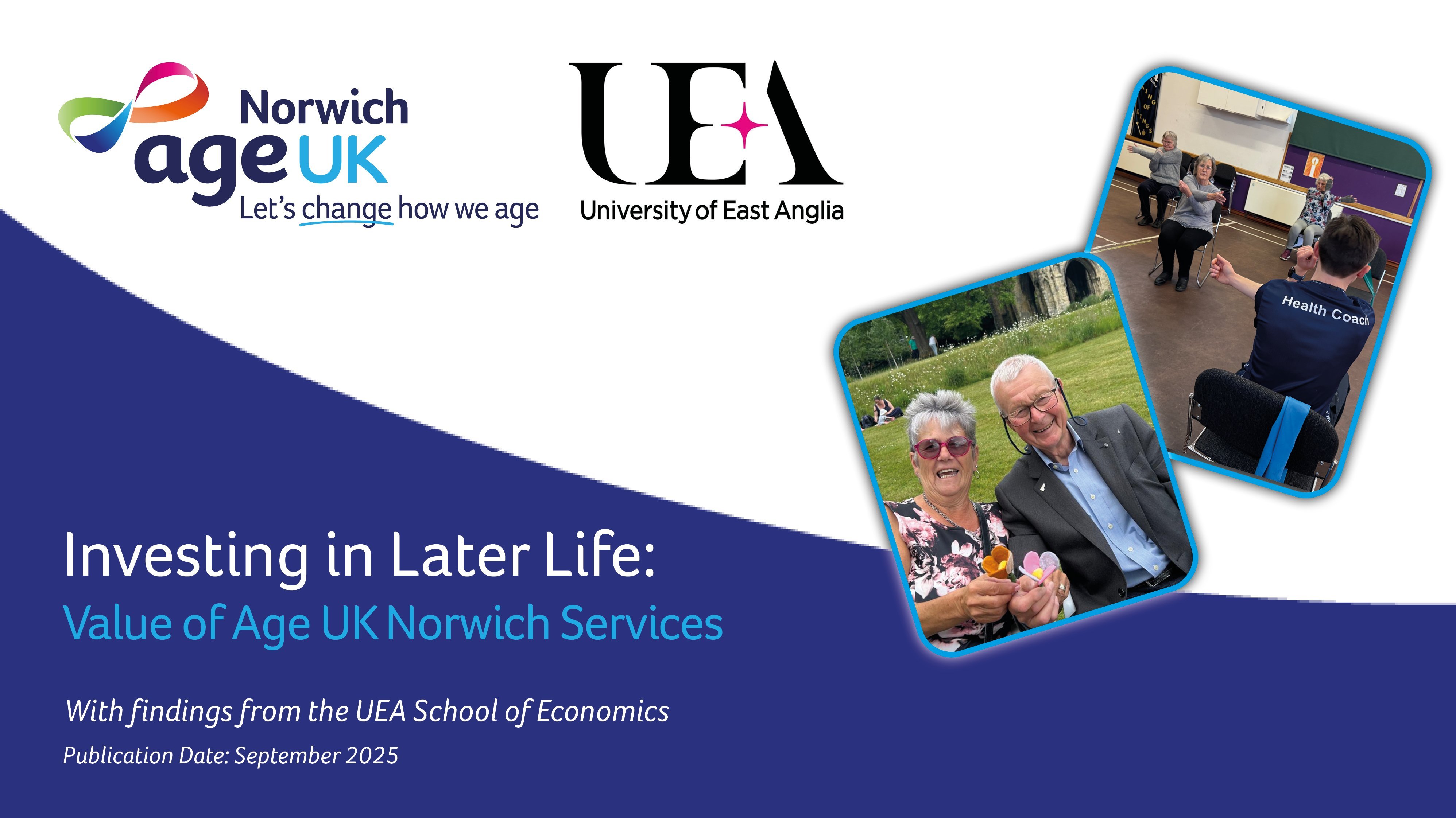UEA Study shows the value of investing in charities

Published on 22 September 2025 08:01 AM
With every tax penny under scrutiny at the moment, finding good value is paramount, particularly when it comes to health and care, one of the largest costs to the government. Anyone who has been supported by a local charity will know the invaluable human value they provide, often at times of significant personal trauma or crisis. What is often overlooked is the significant economic return they provide the city and county. An independent study by the University of East Anglia’s School of Economics has revealed just that, with local charity, Age UK Norwich.
Reviewing four areas of the charity’s work, researchers found returns of £18 for every £1 invested. These are significant returns on finances alone, but through in addition to transforming lives, its saving the NHS, Social Care and local employers millions of pounds every year through preventing ill-health, absenteeism, and crisis services at significantly higher costs.
The report, Investing in Later Life: Value of Age UK Norwich Services was produced by Economic graduates as part of their final-year dissertations. Each examined a core area of Age UK Norwich’s work: Health Coaching, Loneliness & Social Connection, Age Friendly Norwich, and Information & Advice.
Their research applied thorough economic analysis to real-world data, uncovering the true financial and social value of these services. Together, their findings present an overwhelming case for sustained investment in later life support, not only to improve wellbeing but to deliver measurable savings across public services.
Health Coaching
David Bunzl’s study found that Age UK Norwich’s personalised health coaching service, delivered by qualified instructors, generates £18 of social value for every £1 invested. The service helps older people improve mobility, balance, diet, and confidence, while preventing falls, boosting mental health, and reducing GP and hospital visits. At full capacity, the service has the potential to deliver over £5.6 million in social value, while also costing up to 30% less than equivalent NHS physiotherapy.
Tackling Loneliness
Loneliness costs Norwich’s NHS an estimated £99.1 million each year, with 28% of over-50s (12,416 people) classified as lonely. Age UK Norwich combats this through more than 30 clubs and nearly 800 sessions annually, offering activities from lunch clubs to walking football and dementia-friendly groups. Joseph Israel’s report found that these services save the NHS £2.38 million a year in reduced hospital admissions, with every £1 spent returning £14.60 in value. One client described the service saying “I don’t think I would be alive anymore if you didn’t come into my life when you did.”
Age Friendly Norwich
As part of its mission to make Norwich an Age Friendly City, Age UK Norwich champions accessibility, social inclusion, and opportunities for older people to live well. Zhyrrina Caballero’s research highlights how transport, housing, and neighbourhood design directly impact health and wellbeing. Older people using buses 10+ times a year reported 40% fewer symptoms of loneliness compared to those who did not travel at all. These findings underline the importance of local investment in infrastructure and services that keep older people active, connected, and visible in their communities.
Accredited Advice
Age UK Norwich’s accredited advice service delivers one of the clearest returns. In 2023–24 alone, it helped secure £2.87 million in successful benefit applications for older residents, supporting long-term financial resilience during the cost-of-living crisis. For every £1 invested, advice services deliver £7.05 of social value, rising to £12.62 over five years when including NHS savings of more than £4 million. Beyond money, clients report reduced stress, improved mental health, and greater overall life satisfaction. One client put it simply: “Absolutely wonderful… I didn’t know you could get so many benefits... We now get Attendance Allowance for me, pension credit, underlying benefit for Carer’s Allowance, Council Tax reduction to nil, half price water bill. Free TV licence.”
Why Invest in Later Life?
The findings come at a crucial time, as the government seeks to reform public services and reduce NHS pressures. Age UK Norwich’s model demonstrates that investing locally in later life is not a cost, but a return: stronger communities, healthier ageing, and huge public savings.
 Dan Skipper, Chief Executive of Age UK Norwich, said:
Dan Skipper, Chief Executive of Age UK Norwich, said:
“This report confirms what we’ve always known: when you invest in older people, the whole community benefits. Every pound spent on Age UK Norwich creates exceptional value, in healthier lives, reduced NHS demand, and stronger communities.”

Professor Matthew Aldrich, UEA School of Economics, added:
“The results of the evaluation are clear; Age UK Norwich generates significant value through their work directly for the individuals they support, and for our communities and wider society. Further investment would generate a significant return, and I am proud that our students have helped make clear for all to see the social and economic impact of their work.”
 David Bunzl, one of the four researchers said:
David Bunzl, one of the four researchers said:
“My time with Age UK Norwich has given me a huge appreciation for the whole team and the amount of effort that they put into supporting their clients. Now that this project is over, I hope to carry some of the skills and the mindset that the team has into my career as an economist in the civil service.”
